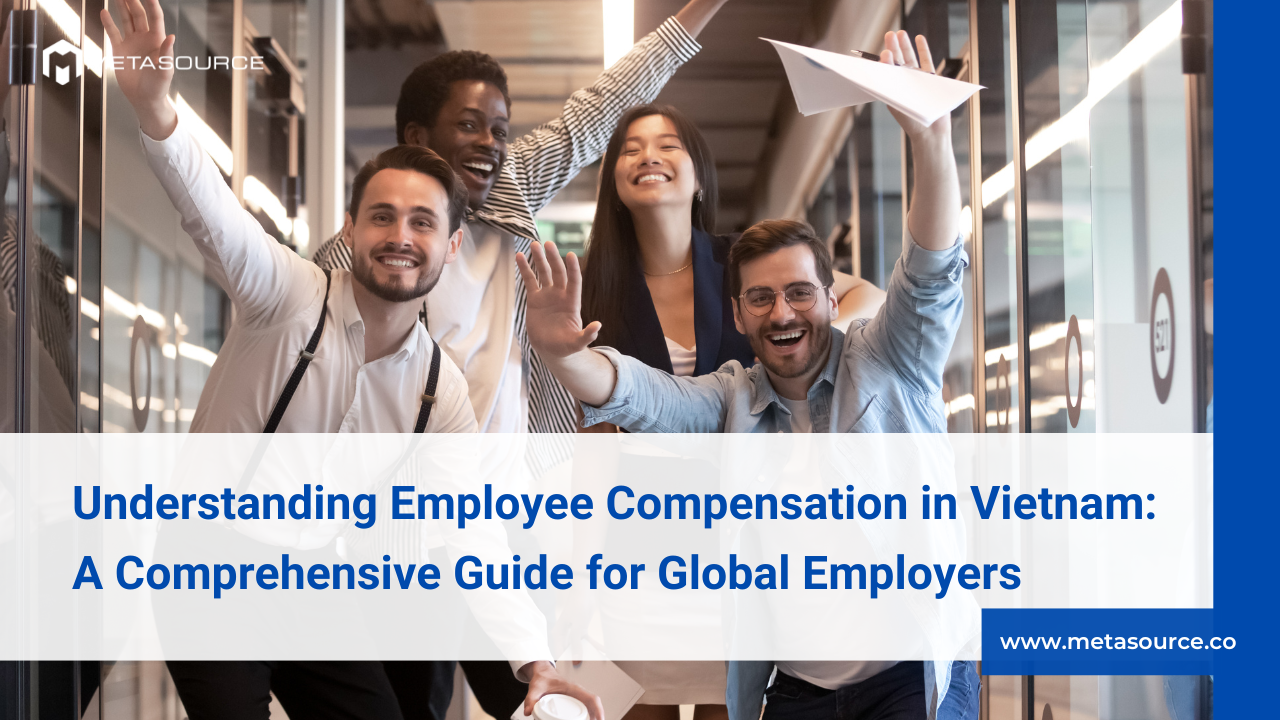In the dynamic landscape of global business, Vietnam has emerged as a beacon for offshore staffing solutions, offering a blend of skilled workforce and cost-effective employment options. For Employer of Record (EOR) hiring managers navigating this terrain, understanding the nuances of Vietnam’s employee compensation structure is pivotal. This guide serves as a beacon, illuminating the path to not only compliance but strategic advantage in the Vietnamese labor market.
I/ What is Employee Compensation?
Employee compensation extends beyond mere wages; it encompasses the total benefits, both tangible and intangible, that employees receive in exchange for their contribution to the organization. In Vietnam, this includes a mix of direct payments like salaries and indirect benefits such as insurance contributions and leaves. A notable aspect unique to Vietnam, and indeed a reflection of its culture, is the distinction between part-time and full-time staff benefits. Full-time employees are typically entitled to a comprehensive suite of benefits, including mandatory social insurance contributions, which are not always applicable to part-time counterparts. This distinction underscores the importance for global employers to understand local employment customs, as differences in culture and employment practices can pose challenges for international hiring managers unfamiliar with the Vietnamese context.
II/ Important Mandatory Compensation Components
1. Minimum Wage Requirements
Vietnam sets its minimum wage by region, reflecting the cost of living variations across the country. Employers must stay abreast of these changes to ensure compliance and competitive compensation strategies.
2. Social Insurance Contributions
A mandatory component for full-time employees involves contributions to social, health, and unemployment insurance, shared between employers and employees. This not only ensures a safety net for the workforce but also aligns with statutory labor requirements.
3. Annual Leaves and Public Holidays
Vietnamese labor law mandates specific provisions for paid annual leave and observes a number of public holidays. Understanding these requirements is crucial for effective workforce planning and operations.
4. Tet Bonus
The Tet bonus, a traditional end-of-year bonus around the Lunar New Year, holds cultural significance in Vietnam. While not legally mandatory, its widespread practice is a testament to its importance in Vietnamese compensation culture.
III. Important Non-Mandatory Compensation Components
1. Health Insurance Benefits
Offering private health insurance can significantly enhance a compensation package, aiding in attracting and retaining talent in Vietnam’s competitive labor market.
2. Performance Bonuses and Incentives
Performance-related bonuses and incentive schemes are prevalent, serving as key motivators and productivity enhancers in the workplace.
3. Training and Development Opportunities
Investing in employee development enriches the workforce and positions the company as an employer of choice.
4. Work-life Balance Initiatives
Flexible working arrangements and work-life balance benefits reflect a modern approach to employee compensation, aligning with global best practices and local expectations.
III/ Why Investing in a Comprehensive Compensation Package is Crucial
Attracting and Retaining Talent
A well-structured compensation package is instrumental in attracting top talent and minimizing turnover, crucial for maintaining a competitive edge in the global marketplace.
Boosting Employee Morale and Productivity
Fair and transparent compensation practices are directly linked to employee satisfaction and productivity, fostering a positive organizational culture.
Compliance with Local Laws
Adherence to Vietnamese compensation laws and regulations is non-negotiable, safeguarding against legal repercussions and ensuring smooth business operations.
Building a Positive Employer Brand
A commitment to comprehensive employee compensation reflects positively on the employer brand, attracting not only potential employees but also clients and partners by demonstrating a commitment to ethical and supportive employment practices.
Conclusion
Understanding and effectively implementing an employee compensation strategy in Vietnam is not merely a legal obligation for global employers but a strategic investment in their workforce. The nuances of the Vietnamese compensation structure, including the cultural significance of certain benefits, pose unique challenges but also opportunities for EOR hiring managers. By embracing these practices, employers can unlock the full potential of their Vietnamese workforce, ensuring both compliance and competitive advantage in the global market. The right approach to compensation is key to achieving success on the international stage, transforming challenges into opportunities for growth and innovation.
Read more: Navigating the Complexities of Obtaining a Working Permit in Vietnam
Read more: How To Register A Limited Liability Company In Vietnam A Quick Guide
Discover more tips to help boost your business further in Vietnam by following us on our website and Linkedln page


